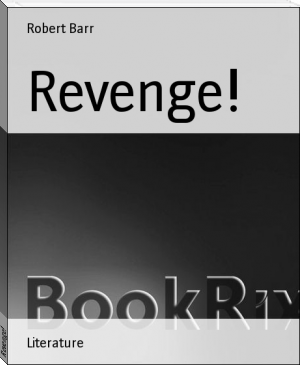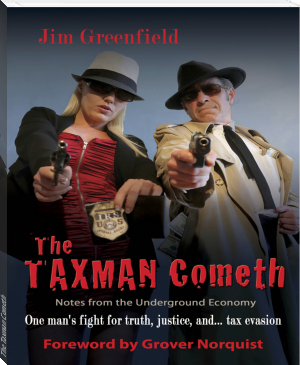Revenge! - Robert Barr (best interesting books to read txt) 📗

- Author: Robert Barr
Book online «Revenge! - Robert Barr (best interesting books to read txt) 📗». Author Robert Barr
Sidney Buller went west from Detroit when he received the telegram that announced his uncle's death and told him he was heir to the ranch. He was thirty years younger than his uncle had been at the time of his tragic death, and he bore a remarkable likeness to the old man; that is, a likeness more than striking, when it was remembered that one had lived all his life in a city, while the other had spent most of his days on the plains. The young man had seen the Sheriff on his arrival, expecting to find that active steps had been taken towards the arrest of the murderer. The Sheriff assured him that nothing more effective could be done than what had been done by the dead man himself in leaving fifty thousand dollars to the killer of Hickory Sam. The Sheriff had made no move himself, for he had been confidently expecting every day to hear that Sam was shot.
Meanwhile, nothing had been heard or seen of the desperado since he left Salt Lick on the back of the murdered man's horse. Sidney thought this was rather a slipshod way of administering justice, but he said nothing, and went back to his ranch. But if the Sheriff had been indifferent, his own cowboys had been embarrassingly active. They had deserted the ranch in a body, and were scouring the plains searching for the murderer, making the mistake of going too far afield. They, like Mike, had expected Sam would strike for the Bad Lands, and they rode far and fast to intercept him. Whether they were actuated by a desire to share the money, a liking for their old "boss," or hatred of Hickory Sam himself, they themselves would have found it difficult to tell. Anyhow, it was a man-chase, and their hunting instincts were keen.
In the early morning Sidney Buller walked forth from the buildings of the ranch and struck for the open prairie. The sun was up, but the morning was still cool. Before he had gone far he saw, approaching the ranch, a single riderless horse. As the animal came nearer and nearer it whinnied on seeing him, and finally changed its course and came directly toward him. Then he saw that there was a man on its back; a man either dead or asleep. His hand hung down nerveless by the horse's shoulder, and swung helplessly to and fro as the animal walked on; the man's head rested on the horse's mane. The horse came up to Sidney, thrusting its nose out to him, whinnying gently, as if it knew him.
"Hello?" cried Sidney, shaking the man by the shoulder, "what's the matter? Are you hurt?"
Instantly the desperado was wide awake, sitting bolt upright, and staring at Sidney with terrified recognition in his eyes. He raised his right hand, but the pistol had evidently dropped from it when he, overcome by fatigue, and drowsy after his enormous meal, had fallen asleep. He flung himself off, keeping the animal between himself and his supposed enemy, pulled the other revolver and fired at Sidney across the plunging horse. Before he could fire again, Sidney, who was an athlete, brought down the loaded head of his cane on the pistol wrist of the ruffian, crying--
"Don't fire, you fool, I'm not going to hurt you!"
As the revolver fell to the ground Sam sprang savagely at the throat of the young man, who, stepping back, struck his assailant a much heavier blow than he intended. The leaden knob of the stick fell on Sam's temple, and he dropped as if shot. Alarmed at the effect of his blow, Sidney tore open the unconscious man's shirt, and tried to get him to swallow some whiskey from the bottle he found in his pocket. Appalled to find all his efforts unavailing, he sprang on the horse and rode to the stables for help.
The foreman coming out, cried: "Good heavens, Mr. Buller, that's the old man's horse. Where did you get him? Well, Jerry, old fellow," he continued, patting the horse, who whinnied affectionately, "they've been using you badly, and you've come home to be taken care of. Where did you find him, Mr. Buller?"
"Out on the prairie, and I'm afraid I've killed the man who was riding him. God knows, I didn't intend to, but he fired at me, and I hit harder than I thought."
Sidney and the foreman ran out together to where Jerry's late rider lay on the grass.
"He's done for," said the foreman, bending over the prostrate figure, but taking the precaution to have a revolver in his hand. "He's got his dose, thank God. This is the man who murdered your uncle. Think of him being knocked over with a city cane, and think of the old man's revenge money coming back to the family again!"
THE UNDERSTUDY.
The Monarch in the Arabian story had an ointment which, put upon the right eye, enabled him to see through the walls of houses. If the Arabian despot had passed along a narrow street leading into a main thoroughfare of London, one night just before the clock struck twelve, he would have beheld, in a dingy back room of a large building, a very strange sight. He would have seen King Charles the First seated in friendly converse with none other than Oliver Cromwell.
The room in which these two noted people sat had no carpet and but few chairs. A shelf extended along one side of the apartment, and it was covered with mugs containing paint and grease. Brushes were littered about, and a wig lay in a corner. A mirror stood at either end of the shelf, and beside these, flared two gas-jets protected by wire baskets. Hanging from nails driven in the walls were coats, waist-coats, and trousers of more modern cut than the costumes worn by the two men.
King Charles, with his pointed beard and his ruffles of lace, leaned picturesquely back in his chair, which rested against the wall. He was smoking a very black brier-root pipe, and perhaps his Majesty enjoyed the weed all the more that there was just above his head, tacked to the wall, a large placard, containing the words, "No smoking allowed in this room, or in any other part of the theatre."
Cromwell, in more sober garments, had an even jauntier attitude than the King, for he sat astride the chair, with his chin resting on the back of it, smoking a cigarette in a meerschaum holder.
"I'm too old, my boy," said the King, "and too fond of my comfort; besides, I have no longer any ambition. When an actor once realises that he will never be a Charles Kean or a Macready, then come peace and the enjoyment of life. Now, with you it is different: you are, if I may say so in deep affection, young and foolish. Your project is a most hare-brained scheme. You are throwing away all you have already won."
"Good gracious!" cried Cromwell, impatiently, "what have I won?"
"You have certainly won something," resumed the elder calmly, "when a person of your excitable nature can play so well the sombre, taciturn character of Cromwell. You have mounted several rungs, and the whole ladder lifts itself up before you. You have mastered two or three languages, while I know but one, and that imperfectly. You have studied the foreign drama, while I have not even read all the plays of Shakespeare. I can do a hundred parts conventionally well. You will, some day, do a great part as no other man on earth can act it, and then fame will come to you. Now you propose recklessly to throw all this away and go into the wilds of Africa."
"The particular ladder you offer me," said Cromwell, "I have no desire to climb; I am sick of the smell of the footlights and the whole atmosphere of the theatre. I am tired of the unreality of the life we lead. Why not be a hero instead of mimicking one?"
"But, my dear boy," said the King, filling his pipe again, "look at the practical side of things. It costs a fortune to fit out an African expedition. Where are you to get the money?"
This question sounded more natural from the lips of the King than did the answer from the lips of Cromwell.
"There has been too much force and too much expenditure about African travel. I do not intend to cross the Continent with arms and the munitions of war. As you remarked a while ago, I know several European languages, and if you will forgive what sounds like boasting, I may say that I have a gift for picking up tongues. I have money enough to fit myself out with some necessary scientific instruments, and to pay my passage to the coast. Once there, I shall win my way across the Continent through love and not through fear."
"You will lose your head," said King Charles; "they don't understand that sort of thing out there, and, besides, the idea is not original. Didn't Livingstone try that tack?"
"Yes, but people have forgotten Livingstone and his methods. It is now the explosive bullet and the elephant gun. I intend to learn the language of the different native tribes I meet, and if a chief opposes me and will not allow me to pass through his territory, and if I find I cannot win him over to my side by persuasive talk, then I shall go round."
"And what is to be the outcome of it all?" cried Charles. "What is your object?"
"Fame, my boy, fame," cried Cromwell, enthusiastically, flinging the chair from under him and pacing the narrow room. "If I can get from coast to coast without taking the life of a single native, won't that be something greater than all the play-acting from now till Doomsday?"
"I suppose it will," said the King, gloomily; "but you must remember you are the only friend I have, and I have reached an age when a man does not pick up friends readily."
Cromwell stopped in his walk and grasped the King by the hand. "Are you not the only friend I have," he said; "and why can you not abandon this ghastly sham and come with me, as I asked you to at first? How can you hesitate when you think of the glorious freedom of the African forest, and compare it with this cribbed and cabined and confined business we are now at?"
The King shook his head slowly, and knocked the ashes from his pipe. He seemed to have some trouble in keeping





Comments (0)